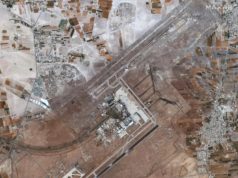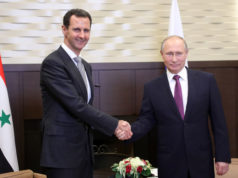The Obama administration appears to have set its sights on Syria as part of its efforts to turn over a new leaf on Middle East policy. Recent days have seen a spate of diplomatic overtures by Washington to the regime of Syrian President Bashar Assad.
These initiatives have ranged from an administration authorization of spare parts for Syrian aircraft to the very public visit to Damascus of Sen. John Kerry, the new chairman of the Senate Foreign Relations Committee.
These overtures represent a major shift in American policy. After all, it was just five years ago that Congress passed the Syria Accountability and Lebanese Sovereignty Restoration Act (SALSA), a comprehensive effort to pressure Damascus to cease its support for U.S.-designated terrorist organizations, withdraw all its forces and security personnel from Lebanon, cease the development of weapons of mass destruction (as well as longer range missiles), and end “all support for, and facilitation of, all terrorist activities inside Iraq.” It did so primarily by targeting Syria’s ability to import goods with more than 10 percent U.S. content – an ambiguous description that has helped dissuade several European companies from dealing with Damascus, based on their fears of commercial repercussions from the United States. In the process, the law has taken on the status of a de facto international boycott – albeit a weak one.
The Obama administration’s recent diplomatic carrots, therefore, suggest a fundamental revision of Syria policy may be in the offing. All this will undoubtedly affect how Europe does business with the regime in Damascus. France, for example, has already significantly softened its approach to Syria. Under President Jacques Chirac, the French government worked with the United States to isolate Syria after the 2005 assassination of Lebanese politician Rafiq Hariri. This changed with France’s 2007 election of Nicolas Sarkozy as its president. He reversed the policy of his predecessor in favor of a diplomatic approach to Damascus.
But Mr. Sarkozy’s energetic approach consisted mainly of giving carrots in the present in exchange for promises of future moderation.
And freed from international isolation, Damascus has begun to drift back into polite society. When the heads of the Mediterranean states met in Paris in July 2008, Mr. Assad was a highly visible fixture – and a much-sought party guest.
And the gains have not been simply political. In the wake of his successful visit to Paris, the Syrian president has opened negotiations with the Paris-based Airbus to purchase jetliners to replace his country’s aging commercial fleet.
At the time, the Bush administration weighed in to stop the deal, which involved products with more than 10 percent American content. Not so now: Syria’s transport minister, Yarub Badr, recently told reporters that the Commerce Department, in an apparent liberalization of sanctions policy, has permitted Boeing to go ahead with a requested repair of the two Syrian jets that were taken out of service in 2008.
The decades-old pattern embraced by the Syrian regime has been to pocket concessions and respond with speeches, declarations and intentions – but rarely with positive actions. Mr. Sarkozy effectively ended Syria’s international isolation based on the belief that the Assad regime would thereafter work to normalize its relations with Lebanon and make real progress in the peace process with Israel. The resulting gains, however, have been minimal – and can be reversed easily.
Washington, however, can succeed where France has failed. With a United Nations-sponsored tribunal set to probe Syria’s complicity in the Hariri assassination, and with new International Atomic Energy Agency revelations about Syria’s nuclear ambitions, Damascus is under siege. Real engagement with Syria will need to exploit this fact.
And if the Obama administration is interested in truly bringing the world’s last Ba’athist state back into the fold, it will need an approach that ties the loosening of international penalties to concrete Syrian actions – rather than one that simply rewards its ruler in hopes that he will come to the negotiating table.





